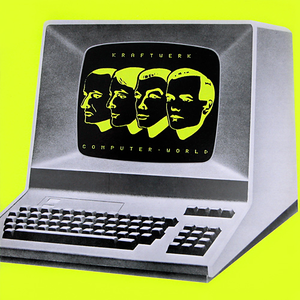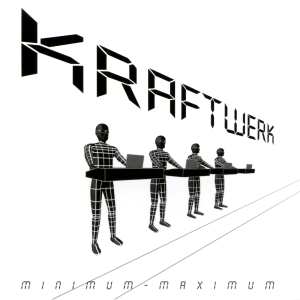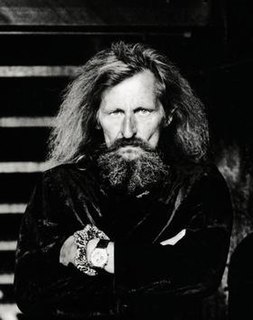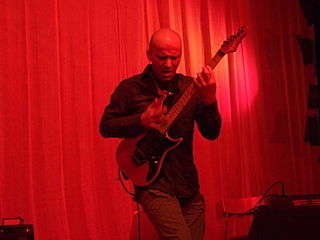
Kraftwerk is a German band formed in Düsseldorf in 1969 by Ralf Hütter and Florian Schneider. Widely considered as innovators and pioneers of electronic music, it was among the first successful acts to popularize the genre. The group began as part of West Germany's experimental krautrock scene in the early 1970s before fully embracing electronic instrumentation, including synthesizers, drum machines, and vocoders. Wolfgang Flür joined the band in 1974: there was also the arrival of Karl Bartos in 1975. From then, the band worked as a quartet.

Autobahn is the fourth studio album by German electronic band Kraftwerk, released in November 1974. It was the band's first album to fully embrace the repetitive electronic sound they would become known for and was inspired by the titular German motorway system.

Vincent John Martin, known professionally as Vince Clarke, is an English synth-pop musician and songwriter. Clarke has been the main composer and musician of the band Erasure since its inception in 1985, and was previously the main songwriter of several groups, including Depeche Mode, Yazoo, and the Assembly. In Erasure he is known for his deadpan and low-key onstage demeanour, often remaining motionless over his keyboard, in sharp contrast to vocalist Andy Bell's animated and hyperactive frontman antics.

Trans-Europe Express is the sixth studio album by German electronic music band Kraftwerk. Recorded in mid-1976 in Düsseldorf, Germany, the album was released in March 1977 on Kling Klang Records. It saw the group refine their melodic electronic style, with a focus on sequenced rhythms, minimalism, and occasionally manipulated vocals. The themes include celebrations of the titular European railway service and Europe as a whole, and meditations on the disparities between reality and appearance.

Tour de France Soundtracks is the eleventh studio album by German electronic music band Kraftwerk. It was first released on 4 August 2003, through Kling Klang and EMI in Europe and Astralwerks in North America. The album was recorded for the 100th anniversary of the first Tour de France bicycle race, although it missed its intended release date for the actual tour. It includes a new recording of their 1983 song of the same name, the cover artwork of both releases being nearly identical. The announcement of the release caused much anticipation, as it had been 17 years since the group had put out a full album of new studio material.

Radio-Activity is the fifth studio album by German electronic band Kraftwerk, released in October 1975. The band's first entirely electronic album, it is a concept album organized around the themes of radioactive decay and radio communication.

The Man-Machine is the seventh studio album by German electronic music band Kraftwerk. It was released on 19 May 1978 by Kling Klang in Germany and by Capitol Records elsewhere. A further refinement of their mechanical style, the album saw the group incorporate more danceable rhythms. It includes the singles "The Model" and "The Robots".

Computer World is the eighth studio album by German electronic band Kraftwerk, released on 10 May 1981.

The Mix is the tenth studio album by German electronic music band Kraftwerk. It was released on 11 June 1991 through Kling Klang and EMI in Europe and through Elektra Records in North America. It featured entirely re-arranged and re-recorded versions of a selection of songs which had originally appeared on the albums Autobahn (1974) through Electric Café (1986). Some of the songs even came with new additional melodies and/or lyrics.

Florian Schneider-Esleben was a German musician. He is best known as one of the founding members and leaders of the electronic band Kraftwerk, performing his role with the band until his departure in 2008.

The Catalogue is a box set consisting of the eight albums by German electronic music band Kraftwerk that were released from 1974 to 2003. All albums are digitally remastered, with most of the cover art redesigned, including rare photographs in the liner notes that were not part of each album's original release.

Minimum-Maximum is the first official live album release by Kraftwerk, released in June 2005, almost 35 years after the group gave its first live performance. The album features two CDs of tracks recorded on the group's world tour during 2004, including concerts in Warsaw, Moscow, Berlin, London, Budapest, Tallinn, Riga, Tokyo, and San Francisco.

Karl Bartos is a German musician and composer known for his contributions to the electronic band Kraftwerk.

"Radioactivity" is a song by the German electronic music band Kraftwerk. It was released in May 1976 as the lead and only single from their fifth studio album, Radio-Activity (1975).

Klaus Dinger was a German musician and songwriter most famous for his contributions to the seminal krautrock band Neu!. He was also the guitarist and chief songwriter of new wave group La Düsseldorf and briefly the percussionist of Kraftwerk.

Franck Vigroux is a French musician, composer and media artist.
Matthew Bourne is an English multi-instrumentalist, primarily working with piano and keyboards.

"National Express" is a song by the Divine Comedy. It was released as the third single from the album Fin de Siècle and reached number eight on the UK Singles Chart and number 18 in Ireland. The song is based on Neil Hannon's observations of life from the window of a National Express coach.

"Musique Non Stop" is a 1986 single by German techno group Kraftwerk, which was featured on the album Electric Café. It was re-released as a remix on their 1991 album The Mix. The single was their first number one on Billboard Hot Dance Club Play and was one of two songs to make it to number one there.

moogmemory is the second solo studio album by English improvising pianist and synthesiser player Matthew Bourne. His first studio album, Montauk Variations, was a series of compositions for solo piano, but moogmemory sees Bourne performing only on the Lintronics Advanced Memorymoog, a specially altered Memorymoog synthesiser. The album was released on 4 March 2016 on The Leaf Label.



















